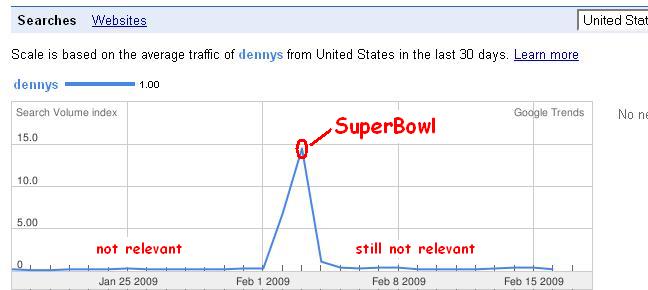Rae: What’s tomorrow’s post about?
Lisa: Denny’s.
Rae: What the [censored] does Denny’s have to do with Internet marketing?
Lisa: [blink] Their Superbowl ad and whether or not they just blew $3million on marketing?
Rae: Oh. Okay. We didn’t see that ad in Canada.
Lisa: [rolls eyes, walks away]
There comes a point in every relationship where you have to ask yourself – why am I doing this? Am I wasting my time? Why am I here and what am I getting out of it? He’s not even that cute.
I have to wonder if that’s a question Denny’s is asking itself right now.
One of the problems I see with companies is that they don’t take the time to define success. They don’t outline what actions are important to their goals or the metrics that they’re using to define them. They’re just throwing stuff out there, hoping something sticks. And they’re doing that because defining success is scary. Once you know what makes you successful, you also know what makes you a failure. No one wants to fail.
If you live in the States, you probably remember that Denny’s received quite a bit of attention and press coverage for their Super Bowl ad a few weeks ago. The ad cost them $3 million and encouraged people to stop on by to get a free Grand Slam breakfast. In case you are like Rae and don’t live in the States, here’s one of the ads that was used:
Cute, right? Uh, sure.
I guess they were successful. Hoards of shamelessly hungry folks showed up, stood in the cold for 45 minutes, and then happily enjoyed their complimentary Grand Slam breakfast. According to Denny’s, an average of 1,400 people were served in each of their 1,541 locations. That, my friends, is the power of “free” in the middle of a recession.
It looks good. But, as far as I can tell, that’s not how Denny’s was defining success.
Denny’s said they wanted to become “relevant” again. The past few years they’ve watched as Starbucks and McDonalds came in to steal away their market share and establish themselves as the place to go for breakfast. Denny’s hoped inviting people in to enjoy a free meal would help woo those customers back and show them the wonderfulness that is Denny’s.
I wanted to see how many people were still talking about Denny’s now that everyone’s had a chance to digest their free meal. Essentially, are people still interested?
Here’s what I found:

See, that doesn’t scream “We’re relevant!” to me. That screams, “We got so caught up in the excitement of a Super Bowl ad that we forgot to consider if this would actually help us.”. Sure, it’s not as catchy, but it’s a hell of a lot more accurate.
Do yourself a favor: Don’t be Denny’s.
Before you throw budget at something, figure out your goals and objectives. Create a path for how you anticipate meeting those goals and make sure your actions complement that. If they do, execute. If they don’t, try again. Don’t just launch.
Of course, maybe I’m wrong. Maybe Denny’s didn’t simply get caught up in the hoopla. Big Thinking for Small Businesses said that if Denny’s can turn just .5 percent of the two million people who showed up for Free Grand Slam Day into customers, then that will increase their customer base by 100,000. Okay, math may be delicious, but that’s a big if. We don’t know that Denny’s will be able to do that. We don’t know that anyone will leave their favorite breakfast place and trek on over. Sales will be the true test, but if conversation is any indicator of relevancy, they failed. The conversation that they tried to start is already dead and buried.
Denny’s could have improved their results by doing two small things:
- Saved the millions and ran it smaller scale: There was no reason to buy a $3 million Super Bowl ad to advertise what most companies would have promoted locally or through national, less costly ads. A free meal is not revolutionary and a $6 breakfast is barely noteworthy. If you’re looking for relevancy, a more targeted local ad may have done the trick. Denny’s should have made themselves relevant to the neighborhoods they were targeting, not try to associate themselves with “a serious breakfast”. I don’t want serious in the morning. I want coffee.
- Told a far more compelling story: If you’re going to invest $3 million, you better be damn sure that you have a good story to tell. Denny’s spoke but said nothing. There was no point of difference conveyed. It was all show and no story. There was no attempt at connecting with people beyond the free breakfast approach. If you’re trying to get people to switch their current habits, you better have one hell of a story for them as to why they should do that. Engage me. Excite me. Turn me on. Do something. Evoke something. Tousle me up enough that I remember you in the morning. Otherwise, just shut up.
I don’t know much about football, but this was a fumble. It was a weak message presented poorly and leveraged even worse. Perhaps if there was a better marketing campaign centered around the commercial, one that encouraged the conversation to live on beyond that one day, I’d be more impressed. But there wasn’t. The Super Bowl isn’t just another advertising opportunity, it’s the advertising opportunity.
When you have the chance to do something great, invest in it. Because if you’re like me, achieving a little success when you know it could have been greater, hurts more than no success at all.


